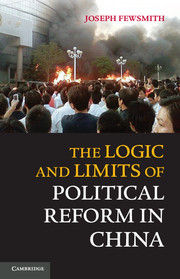3 - Inner-Party Democracy
Published online by Cambridge University Press: 05 January 2013
Summary
As China began to emerge from the trauma of the 1989 Tiananmen events, its leadership began to cast about for new frameworks in which to think about political reform. After all, the problems that had generated vigorous debate on political reform and had led the Thirteenth Party Congress in 1987 to adopt proposals for removing party groups from State Council ministries and to establish a civil service were still there. “Democracy” was still a good word, and it would have a continuing impact on the way intellectuals and practitioners thought about political reform. Added to the discourse, however, were new concerns about institution building. Increasingly, people began to speak of the Chinese Communist Party (CCP) as a “ruling party” (zhizheng dang); the implication was that the time had come to do away with the sort of politics associated with the CCP when it was a revolutionary party (geming dang): secretive, personalistic, divided by political struggles, arbitrary, and often hostile to societal interests. It was time to subject the party to accountability, to normalize its relations with society, and to select its leaders at various levels in a more democratic way according to agreed-upon procedures. The party needed to rebuild its legitimacy through its own institutionalization.
What such ideas meant in practice was open to debate and experimentation. Most people assumed that some sort of democracy – socialist democracy, whatever precisely that meant – would be a part of the formula. The Fourteenth Party Congress in 1992 declared that the development of socialist democracy would ensure that “institutions and laws will not change with changes in the leadership or changes in the views or focus of attention of any leader.” At the Fifteenth Party Congress, meeting five years later and only months after Deng Xiaoping's death, Jiang Zemin announced that “without democracy there would be no socialism or socialist modernization” and he called for “grassroots organs of power” to “establish a sound system of democratic elections.” This call for democracy was closely linked to the efforts to create a more sound legal system and stronger institutions. The work report of the Fifteenth Party Congress stressed “governing the country through law” (yifa zhiguo).
- Type
- Chapter
- Information
- The Logic and Limits of Political Reform in China , pp. 68 - 107Publisher: Cambridge University PressPrint publication year: 2013

